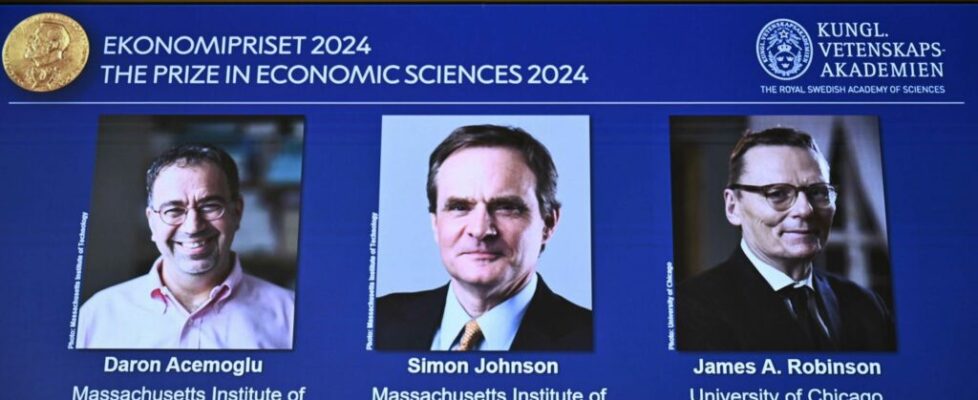No Prosperity Without Economic and Political Liberty
The Royal Swedish Academy of Sciences awarded the Sveriges Riksbank Prize in Economic Sciences in Memory of Alfred Nobel 2024 to three American economists whose work established the critical role of inclusive economic and political institutions for ending humanity’s state of abject poverty. The winners are MIT economists Daron Acemoglu and Simon Johnson, and University of Chicago economist James Robinson—all three are immigrants to this country.
The Nobel committee focused on the economists’ analyses of how differences in European colonial institutions affected the eventual prosperity (or not) of regions colonized by various European countries. However, it is worth noting that the institutional changes that spark sustained innovation and economic growth first occurred in a few of those colonizing countries. Classical liberals and libertarians have long endorsed the Nobelists’ main claim that countries that evolved inclusive institutions, e.g., free markets, property rights, the rule of law, and democratic governance will tend to prosper. Whereas those that retain extractive institutions will remain stuck in immemorial poverty. As the researchers show, colonized regions to which inclusive institutions were exported have tended to prosper whereas those on which extractive institutions were imposed have not.
Doubtlessly, differences in colonial settlement and administration have had a profound effect on economic and political outcomes in formerly colonized regions. It is, however, important to keep in mind that until a couple of centuries ago, essentially all human societies were based on extractive institutions that chiefly benefited political elites, e.g., monarchs, aristocrats, and eventually Soviet commissars. As a result, the natural state of humanity was abject poverty as long-run per capita income data from the Maddison Project demonstrates.
(Roser & Ortiz-Ospina)
Only with the advent of what the Nobelists call inclusive political and economic institutions in a few Western European nations two centuries ago did per capita incomes begin a sustained rise anywhere in the world. In my review of Acemoglu and Robinson’s Why Nations Fail: The Origins of Power, Prosperity and Poverty, I summarized their insights:
Every set of extractive institutions is extractive in its own way, while all sets of inclusive institutions are inclusive in pretty much the same way. For example, ancient Rome ran on slavery; Russia on serfdom, Imperial China strictly limited domestic and foreign commerce; India depended upon hereditary castes; the Ottoman Empire relied on tax farming; Spanish colonies on indigenous labor levies; sub-Saharan Africa on slavery; the American South on slavery and later a form of racial apartheid not all that unlike South Africa’s; and the Soviet Union on collectivized labor and capital. The details of extraction differ but the institutions are organized to chiefly benefit elites.
So why don’t extractive elites encourage economic growth? After all, growth would mean more wealth for them to loot. Acemoglu and Robinson show that the institutions that produce economic growth are inevitable threats to the power of reigning elites. The “key idea” of their theory: “The fear of creative destruction is the main reason why there was no sustained increase in living standards between the Neolithic and Industrial revolutions. Technological innovation makes human societies prosperous, but also involves the replacement of the old with the new, and the destruction of the economic privileges and political power of certain people.” Thus throughout history reactionary elites naturally resisted innovation because of their accurate fear that it would produce rivals for their power.
The Economic Freedom Index, issued annually by The Wall Street Journal and the Heritage Foundation, combines scores accounting for the prevalence of free markets and trade, the rule of law, government size, and regulatory efficiency in each country. This basically tracks the inclusive institutions that the three Nobelists identify as essential to promoting economic growth and democracy. On the map below, gradations from green to red indicate decreasing economic freedom.
(WSJ/Heritage)
The Human Development Index scores are a composite of per capita income, average educational achievement, and average life expectancy. Darker colors indicate higher HDI scores.
Of course it is no surprise to libertarians and classical liberals that high HDI scores correlate pretty well with high economic freedom index scores. Unfortunately for the billions still living in poverty, the Economic Freedom Index has recently fallen globally to a 23-year low.
(UN)
Oddly, fine economic historian Deidre McCloskey in her recent column for the Brazilian publication Folha denounces Acemoglu a “statist Nobel.” She claims that Acemoglu believes that “the state is all wise.” Contrariwise, Acemoglu and Robinson both flatly assert, “You can’t engineer prosperity.” In Why Nations Fail, the two write: “What can be done to kick-start or perhaps just facilitate the process of empowerment and thus the development of inclusive political institutions? The honest answer of course is that there is no recipe for building such institutions.” These observations are not all that statist. Her tight focus on the cultural roots of liberalism has perhaps led her to misconstrue as somehow “statist” an institutionalist account of how economic liberty produces prosperity.
The post No Prosperity Without Economic and Political Liberty appeared first on Reason.com.
